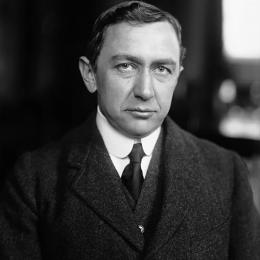#Leadership : This 100-Year-Old To-Do List Hack Still Works Like A Charm…The “Ivy Lee Method” is Stupidly Simple, and That’s Partly Why It’s so Effective.
Accounts differ as to the date, but according to historian Scott M. Cutlip, it was one day in 1918 that Schwab—in his quest to increase the efficiency of his team and discover better ways to get things done—arranged a meeting with a highly respected productivity consultant named Ivy Lee.

Lee was a successful businessman in his own right and is widely remembered as a pioneer in the field of public relations. As the story goes, Schwab brought Lee into his office and said, “Show me a way to get more things done.”
“Give me 15 minutes with each of your executives,” Lee replied. “How much will it cost me?” Schwab asked. “Nothing,” Lee said. “Unless it works. After three months, you can send me a check for whatever you feel it’s worth to you.”
THE IVY LEE METHOD
During his 15 minutes with each executive, Lee explained his simple method for achieving peak productivity:
- At the end of each workday, write down the six most important things you need to accomplish tomorrow. Do not write down more than six tasks.
- Prioritize those six items in order of their true importance.
- When you arrive tomorrow, concentrate only on the first task. Work until the first task is finished before moving on to the second task.
- Approach the rest of your list in the same fashion. At the end of the day, move any unfinished items to a new list of six tasks for the following day.
- Repeat this process every working day.
The strategy sounded simple, but Schwab and his executive team at Bethlehem Steel gave it a try. After three months, Schwab was so delighted with the progress his company had made that he called Lee into his office and wrote him a check for $25,000.
A $25,000 check written in 1918 is the equivalent of a $400,000 check in 2015.
The Ivy Lee Method of prioritizing your to-do list seems stupidly simple. How could something this simple be worth so much?
What makes it so effective?
ON MANAGING PRIORITIES WELL
Ivy Lee’s productivity method utilizes many of the concepts I have written about previously.
Here’s what makes it so effective:
It’s simple enough to actually work. The primary critique of methods like this one is that they are too basic. They don’t account for all of the complexities and nuances of life. What happens if an emergency pops up? What about using the latest technology to our fullest advantage? In my experience, complexity is often a weakness because it makes it harder to get back on track. Yes, emergencies and unexpected distractions will arise. Ignore them as much as possible, deal with them when you must, and get back to your prioritized to-do list as soon as possible. Use simple rules to guide complex behavior.
It forces you to make tough decisions. I don’t believe there is anything magical about Lee’s number of six important tasks per day. It could just as easily be five tasks per day. However, I do think there is something magical about imposing limits upon yourself. I find that the single best thing to do when you have too many ideas (or when you’re overwhelmed by everything you need to get done) is to prune your ideas and trim away everything that isn’t absolutely necessary. Constraints can make you better. Lee’s method is similar to Warren Buffet’s 25-5 Rule, which requires you to focus on just five critical tasks and ignore everything else. Basically,if you commit to nothing, you’ll be distracted by everything.
Like this Article ? Share It ! You now can easily enjoy/follow/share Today our Award Winning Articles/Blogs with Now Over 2.5 Million Growing Participates Worldwide in our various Social Media formats below:
FSC LinkedIn Network: (Over 15K+ Members & Growing !) www.linkedin.com/in/frankfsc/en
Facebook: (over 12K) http://www.facebook.com/pages/First-Sun-Consulting-LLC-Outplacement-Services/213542315355343?sk=wall
- Google+: (over 800K)https://plus.google.com/115673713231115398101/posts?hl=en
- Twitter: Follow us @ firstsunllc
educate/collaborate/network….Look forward to your Participation !
Continue of article:
It removes the friction of starting.The biggest hurdle to finishing most tasks is starting them. (Getting off the couch can be tough, but once you actually start running, it is much easier to finish your workout.) Lee’s method forces you to decide on your first task the night before you go to work. This strategy has been incredibly useful for me: As a writer, I can waste three or four hours debating what I should write about on a given day. If I decide the night before, however, I can wake up and start writing immediately. It’s simple, but it works. In the beginning, getting started is just as important as succeeding at all.
It requires you to single-task. Modern society loves multitasking. The myth of multitasking is that being busy is synonymous with being better. The exact opposite is true. Having fewer priorities leads to better work. Study world-class experts in nearly any field—athletes, artists, scientists, teachers, CEOs—and you’ll discover one characteristic that runs through all of them: focus. The reason is simple. You can’t be great at one task if you’re constantly dividing your time 10 different ways. Mastery requires focus and consistency.
The bottom line? Do the most important thing first each day. It’s the only productivity trick you need.
James Clear writes about self-improvement tips based on proven scientific research at JamesClear.com, where this article first appeared. It is adapted with permission.
FastCompany.com | JAMES CLEAR | 08.22.16 5:00 AM
[/fusion_builder_column][/fusion_builder_row][/fusion_builder_container]
